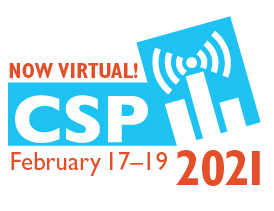Conference Information
The Conference on Statistical Practice aims to bring together hundreds of statistical practitioners—including data analysts, researchers, and scientists—who engage in the application of statistics to solve real-world problems on a daily basis.
The goal of the conference is to provide participants with opportunities to learn new statistical methodologies and best practices in statistical analysis, design, consulting, and statistical programming. The conference also provides opportunities for attendees to further their career development and strengthen relationships in the statistics community.
CSP is based on the following four themes:
The objective of this theme is to help conference participants develop skills and perspectives that increase their potential for organizational impact as managers, leaders, mentors, and strategists. Presentations will enable participants to return to their jobs with new ideas, techniques, and strategies for improving their ability to assume leadership roles, develop and advance their careers, and assist others in doing the same. Potential topics include the following:
- Organizational impact and influence
- Building infrastructure
- Team building and strategy
- Diversity and inclusion
- Leadership and management
- Mentoring
- Career development and advancement
- Statistical ethics
The objective of this theme is to provide attendees with practical knowledge about initiation of new projects, impact of study design and sampling, importance of data collection and data management, data engineering, and related challenges for structured and unstructured data. Presentations will feature information relevant to a broad range of applied statisticians working in diverse settings. Potential topics include the following:
- Study, experimental, or trial design
- Sampling methodology
- Statistical analysis plans and case report forms
- Data management
- Data engineering
- Data and study ethics
- Educating others about study design and data
The objective of this theme is to provide attendees with practical knowledge about modeling and analyzing data of various forms through the application of state-of-the-art statistical or machine learning methods. Presentation methods should use illustrative data analysis examples and may focus on a variety of data types from varied applied settings. Presentations will feature information relevant to a broad range of applied statisticians working in diverse settings. Potential topics include the following:
- Modeling
- Inferential and hypothesis testing
- Predictive analytics
- New packages or procedures
- Implementing reproducible methods
- Analytics, big data, and unstructured data analytic methods
- Machine learning
- Evidence-guided statistical practice
The objective of this theme is to help conference participants develop skills that will improve their written and verbal communication of both scientific and nonscientific information, thus enabling them to increase their impact as strategic, consultative, and collaborative statisticians. Potential topics include the following:
- Finding your voice
- Presenting statistical results to nonstatisticians
- Understanding your audience
- Writing and reviewing manuscript submissions
- Tips and tricks for successful grant writing
- Writing white papers for industry
- Data visualization techniques
- Speaking to the media
- Ethical statistical communication
- Educational efforts in communication
- Best practices in consulting and collaboration
